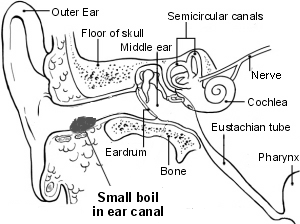Boil in the ear canal
Peer reviewed by Dr Colin Tidy, MRCGPLast updated by Dr Doug McKechnie, MRCGPLast updated 19 Dec 2024
Meets Patient’s editorial guidelines
- DownloadDownload
- Share
- Language
- Discussion
- Audio Version
In this series:EaracheEustachian tube dysfunctionMiddle ear infection (otitis media)Outer ear infection (otitis externa)Fungal ear infectionBarotrauma to the ear
A small boil (furuncle) that occurs in the ear canal can be very painful. It usually clears without treatment. However, painkillers and antibiotic medicines are sometimes needed. Tips on how to help prevent further episodes are given below.
In this article:
Video picks for Ear infections
Continue reading below
Symptoms of a boil in the ear canal
Boil in the ear canal

A boil in the ear canal can cause:
Pain that may become quite severe even though the boil is usually small.
Itch and skin irritation.
Temporary hearing loss.
Sudden discharge from the hear if the boil has bursts.
What causes a boil in the ear canal?
Back to contentsWhat happens when you get boils in the ear canal?
Mostly they occur 'out of the blue' for no apparent reason, like most spots or small boils that can occur on any area of the skin. In some cases the infection develops on damaged skin. The skin in the ear canal can become damaged by being poked with such objects as a cotton wool bud. Slightly damaged skin can quickly become inflamed and infected.
Continue reading below
What is the treatment for a boil in the ear canal?
Back to contentsLike most small spots or tiny boils, a furuncle is likely to go without any treatment. The body's immune system can usually clear germs (bacteria) that cause boils. However, the pain may be significant until it goes.
The following may be used as treatment:
Painkillers such as paracetamol or ibuprofen can be bought over the counter.
A cloth (flannel) soaked in hot water and then held against the ear may relieve the pain.
Antibiotics, such as flucloxacillin, are sometimes needed if the infection does not clear on its own or if the infection is severe.
Occasionally the boil becomes very large and painful. An ear specialist referral may be needed if this happens.
How to prevent infections in the ear canal
Back to contentsSome people find that substances such as water, soap or shampoo which gets into their ears can cause irritation or itch. The itch may cause them to poke or scratch the ear canal with a finger or a cotton wool bud. This may damage the skin in the ear canal and cause inflammation. Inflamed skin can quickly become infected.
Some people try to clean out their ears with cotton buds. This is not only unnecessary but may damage the skin in the ear canal.
Prevention of boils or infections in the ear canal can be helped by:
Trying not to scratch or poke the ear canal with fingers, cotton buds, towels, etc.
Not cleaning the ear canal with cotton buds. They may scratch or irritate and may push dirt and wax further into the ear. The ear will clean itself, and bits of wax will fall out now and then.
For particularly sensitive ears which get frequent infections: Keeping the ear canal dry and avoid soap or shampoo getting in. This can be done whilst showering by placing a piece of cotton wool coated in soft white paraffin (for example, Vaseline®) in the outer ear. It is best not to use corners of towels or cotton buds to dry any water that does get into the ear canal as this will only push things further in. It is best to let the ear dry naturally. When swimming it is best to try to keep the ears dry. This can be done by wearing a tightly fitting cap that covers the ears. Some swimmers use silicone rubber earplugs. Some earplugs can cause more irritation to the skin in the ear canal.
Patient picks for Ear infections

Ear, nose and throat
Fungal ear infection
Fungal ear infection is an infection of the ear with a fungus. It normally involves the ear canal that runs from the ear hole to the eardrum (the external auditory canal). The medical term for it is otomycosis.
by Dr Surangi Mendis, MRCGP

Ear, nose and throat
Vestibular neuritis and labyrinthitis
Vestibular neuritis and labyrinthitis are thought to be caused by a viral infection that affects the inner ear. These two conditions typically cause vertigo, often with sickness (vomiting). Vertigo is the sensation that you or your surroundings are moving. In most cases the symptoms gradually ease and go within a few days or weeks. Medication may help to ease symptoms.
by Dr Surangi Mendis, MRCGP
Further reading and references
- Otitis externa; NICE CKS, May 2024 (UK access only)
- Boils, carbuncles, and staphylococcal carriage; NICE CKS, May 2024 (UK access only)
Continue reading below
Article history
The information on this page is written and peer reviewed by qualified clinicians.
Next review due: 18 Dec 2027
19 Dec 2024 | Latest version

Ask, share, connect.
Browse discussions, ask questions, and share experiences across hundreds of health topics.

Feeling unwell?
Assess your symptoms online for free
Sign up to the Patient newsletter
Your weekly dose of clear, trustworthy health advice - written to help you feel informed, confident and in control.
By subscribing you accept our Privacy Policy. You can unsubscribe at any time. We never sell your data.